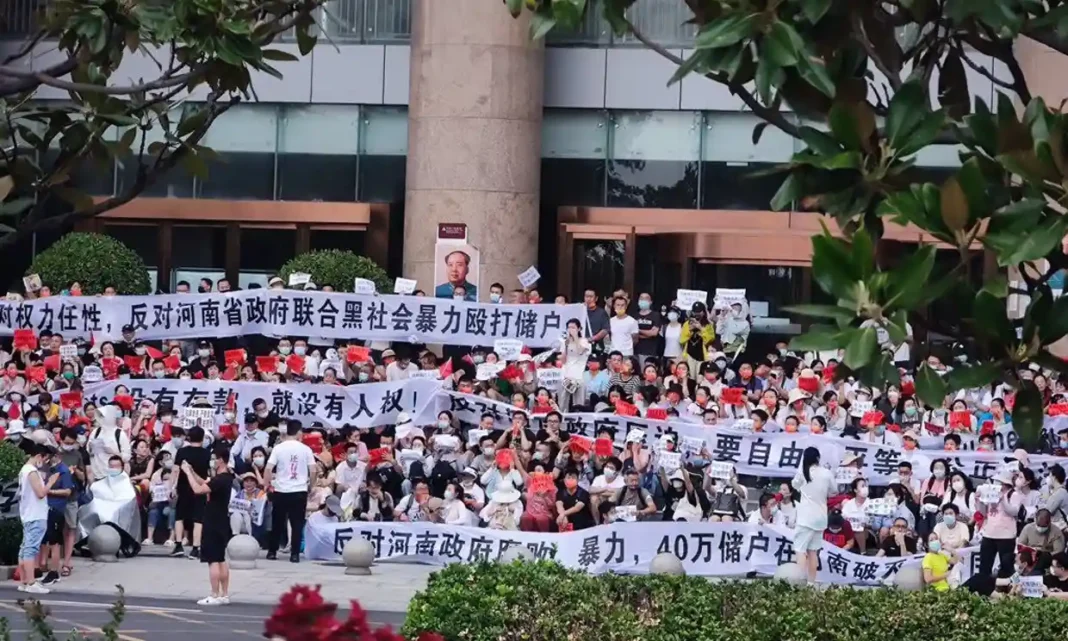A rare large-scale protest in China’s central Henan province has been violently broken up by unidentified security personnel, amid outcry over a financial scandal that has exposed the fragility of the country’s banking system.
A crowd of more than 1,000 protesters, according to some estimates, had gathered on Sunday in front of the Zhengzhou sub-branch of the People’s Bank of China to attempt to recover frozen savings held in rural banks.
Footage reviewed by the Guardian showed protesters demanding local authorities help them retrieve their savings. Some held banners that said: “Henan banks, give me my money back!”, while others called for China’s premier, Li Keqiang, to personally intervene.
White-shirted security guards confronted the crowd. Video showed them dragging protesters and beating them up. One man with a swollen eye said he had been beaten by “gangsters” and dragged on to a bus by police.
Late on Monday night, Henan’s provincial banking and insurance regulator said customers will begin to get some of their money back. Individual customers with deposits of up to 50,000 yuan ($7,442) will be repaid starting Friday, the regulator said, while arrangements for repaying others will be separately announced.
The authorities’ claim on Monday that the problems were caused by a takeover of the bank by “criminal gangs” which they said dated back to 2011 was met with scepticism on Chinese social media where the incident in Zhengzhou was being followed closely.
A number of angry commenters posted on the Weibo account of the US embassy, urging Washington to pay attention to the plight of the victims.
In April, a large number of depositors caused a bank run when they tried to withdraw their savings from four banks in Henan. They then began to stage demonstrations to demand their money back.
The saga drew further attention in June, when some protesters reported that their personal health codes – which are now mandatory for almost all Chinese citizens to access public venues – turned red to indicate they were Covid positive. They suspected local officials were behind the move, in an attempt to dissuade them from complaining.
One of the victims was Ms Yang, who had 499,500 yuan (£62,000) held in one of the banks. On 18 April, she discovered she was unable to access her funds. “I got the red code for about 10 days [when trying to complain],” she told the Guardian. “The government should help us to resume cash withdrawal service as early as possible, so that we can resume our normal life.”
Advertisement
Henan province’s banking and insurance regulator said late on Sunday that it was “accelerating” plans to tackle the local financial crisis and “protect the legal rights and interests of the broader public”.
“(Authorities) are coming up with a plan to deal with the issue, which will be announced in the near future,” the statement said.
Earlier reports blamed “criminal gangs” for taking control of local banks. Gangs had made illegal transfers through fictitious loans and used their shareholdings – as well as “manipulation of executives” – to effectively take over several local banks starting in 2011, Henan police said.
Michael Pettis, a professor of finance at Peking University, said the events in Henan had been a “very worrying reminder” of what would happen if China’s existing economic model became unsustainable.
“It seems that any long period of soaring real-estate prices and explosive growth in debt creates powerful incentives for excessive risk-taking and even fraud,” said Pettis.
The result, he said, was that as the authorities took steps to rein in the bubble, they were always caught unprepared for the extent of the hidden losses and fraud they discovered in the system.
He added: “Because the past decade in China has seen a real estate bubble of historic proportions, along with among the fastest increases in debt ever seen, I suspect we are going to see a lot more of this in the next few years.”
The scandal has rocked Chinese regulators. After it was first reported in April, Henan’s Provincial Commission for Discipline Inspection launched a special campaign targeting rural lenders, according to the Chinese business journal Caixin, citing sources familiar with the matter.

